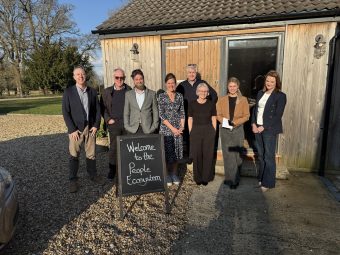
Women in Tech: our Senior Developer’s perspective
As a progressive organisation, we’re always on the lookout for diverse voices and upcoming talent; a diverse team brings different experiences and ideas, providing the opportunity for further learning, collaboration and improvement. But it’s impossible to ignore the limited representation of women and minority voices and glaring gender bias in the development world.
Here, our senior developer, Cristina Tarantino has provided her insight on why certain voices aren’t as prominent in the industry, what we can do both personally and professionally to improve this, and why being a woman in tech is a rewarding career choice.
Cristina’s background
As a child, Cristina grew up taking things apart and putting them back together again with her brothers. Problem solving and figuring out how things worked from a young age likely played a big hand in her subsequent career choice in adult life:
“I got into coding because I love solving problems. If I have a problem, I love to examine it, question it and divide it into manageable chunks.”
Naturally leaning towards more technical work, Cristina was drawn to a career in technology. After graduating from The University of Bari Aldo Moro with a degree in Computer Science and Technologies for Software Production, Cristina pursued her career in the development field where a problem-solving attitude is part and parcel of the job.
“I love to provide helpful output. I know my solution will hopefully make somebody’s life easier.”
Challenges that women face in the development industry
Although discrimination shouldn’t occur in professional environments, it’s an all too common experience for many women. There’s nothing inherently gender-specific about coding, and as such the opportunities afforded to women should be as prominent and available as they are for men.
“The job of a developer is about planning, sizing up projects and embracing different facets of company life, such as support, emails and liaising with multiple departments. You’ll need to have meetings with clients and support their needs, making an effort to understand them, challenge their ideas where appropriate and adapt your work.
It’s more than just coding; you have to be an all-rounder.”

Why it’s great to be a woman in tech
Although women face challenges in the male-dominated tech industry, it’s important to highlight the possibilities for growth. The path isn’t always easy, but being able to increase representation for women benefits everyone. As Cristina points out, there are opportunities available, and the industry needs diversity in order to progress:
“It’s great to be a woman in tech because of the wide range of opportunities; medicine, sound, AI or data analysis, you name it, there will probably be an application for it.
Personally, I love to work in tech because of its diverse nature; everything that runs on software has to be built to cater for a wide variety of individuals.”
During our interview, Cristina made multiple parallels between motherhood, being a wife and her role in the development industry. Whilst many women feel as though the other parts of their identity, such as a partner, spouse or mother, might not be welcomed in the workplace, these separate roles bring further insight and context to the work women do.
“Coders have to be diverse to be able to bring a fresh perspective. The more diverse people you have, the better the solution is.”
Getting started in development
[Insert ‘getting-started-development.jpeg’ here]
So what should you do if you’re considering taking the next step into development?
Cristina says that you need to consider what you really want. Being honest about what she wanted from an employer and a career, and sticking to that criteria, meant Cristina found a job that she truly enjoys.
“Focus on what you like, and don’t settle for the first job offer you receive. Interview with multiple companies, and ask lots of questions. Interviews are a two-way street.”
Equally, it might be tempting to make an effort to be more like your peers, but Cristina advises that the best thing you can do is be yourself. Although it’s a cliché, accepting who you are is a true sign of confidence and self-respect, which is vital for success as a woman in the digital development industry.
“Don’t try to be like your male peers; don’t lose yourself. If the company recognises your way of being, it means they’re right for you; you don’t have to pretend to be what you’re not.
By being yourself you’ll become more confident, which will naturally make you more assertive; with assertiveness comes authority”
Working for Versantus as a woman in tech
We may be biased, but hearing our team’s personal accounts of their Versantus experience is encouragement that we’re on the right track. As Cristina goes on to explain, creating a progressive, respectful environment starts from the top:
“Nik is great at finding good people who have diverse backgrounds. We have a lot of people who changed careers, but they’ve all been supported. It makes you more rounded as a company because everyone has a different background. The fact that you haven’t been coding your entire life can often mean you’re more willing to learn, and consequently bring something new to the table.”
Healthy, supportive company culture is something we work hard to maintain at Versantus. As the team comprises parents and individuals with varying commitments, the company culture serves to help make their life easier and their work more enjoyable.
“Whilst we have lots of parents that work part-time or flexibly to be present in their family life, we’re focused on quality of work and working together as a team for the best output. Lockdown showed us that this approach works.”
Looking to the future
The interview with Cristina was a great opportunity to talk about the challenges women face in the digital industry. Whilst sharing personal experiences was, and still is, cathartic, it’s important that we also look further than the current landscape for women in tech. The onus is not just on women to get involved in the industry and be vocal, it’s also on our colleagues, bosses and business owners to make room for diversity and inclusion. If you’d like to hear more about Versantus’ company culture, you can read about how we’ve been looking after our team during the pandemic and beyond.
More in People

Helping Ordinary People do Extraordinary Things
B4 Members Hall Personal Training have recently renewed their B4 Membership. Executive Director, Becky Hall, explains more about Hall’s role in the lives of their clients and why renewing with B4 was a simple decision.

The Importance of Challenging Conversations in the Workplace
In March the People Ecosystem was lucky enough to be joined by Sally Naunton, CEO of The Bray Group. Having worked with Sally to help unpick some work challenges, I know she has a brilliant blend of being caring whilst expecting high performance and not shying away from the space that’s about tricky conversations. I spend a lot of time helping clients in this space which is why I wanted to get stuck into the subject of feedback, particularly when it feels uncomfortable and is about poor performance.

Stephen Clarke: Leading the Way at the ATOM Festival of Science...
Stephen Clarke, our Principal at Cherwell College Oxford, is not only a distinguished leader and former British diplomat, but also a passionate advocate for science and education. As the Chairman of ATOM Festival of Science & Technology, Stephen plays a pivotal role in bringing world-class scientific discussions and innovations to the heart of Abingdon. Stephen’s leadership ensures that the festival remains dynamic, inclusive, and engaging for people of all ages.
From this author

Greener websites: taking the green initiative in digital
Like all businesses, we’re working hard to reduce our environmental impact. The time for ‘business as usual’ is behind us, and at Versantus we want to help our customers reduce the carbon footprint of their digital assets. Of course there’s a moral obligation to look after our planet, but, if you rely heavily on digital channels to do business, there’s a financial benefit too.

Core Web Vitals: what you need to know and how to...
The rise in slow-loading websites, intrusive pop ups and unexpected page shifts has led Google to crack down on poor user experience (UX). With the inclusion of Core Web Vitals to Google’s ranking factors, knowing how your website scores and improvements you can make will help you stay afloat once the upcoming updates take effect.

Reward, Recognise & Retain
How important is the well-being of your team to you? And what have you been doing as a business to ensure your employees are happy?

